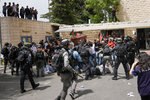
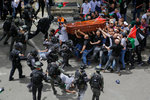
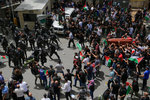
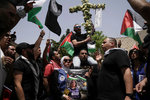
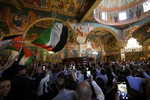
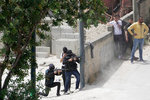
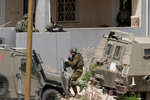
JERUSALEM (AP) — Israeli police on Friday moved in on a crowd of mourners at the funeral of Al Jazeera journalist Shireen Abu Akleh, beating demonstrators with batons and causing pallbearers to briefly drop the casket.
The crackdown came during a rare show of Palestinian nationalism in east Jerusalem — the part of the holy city that Israel captured in 1967 and that the Palestinians claim as their capital.
Israel says east Jerusalem is part of its capital and has annexed the area. Israel routinely clamps down on any displays of support for Palestinian statehood.
Thousands of mourners, some hoisting Palestinian flags and chanting “Palestine, Palestine,” attended the funeral for Abu Akleh, who witnesses say was shot and killed by Israeli forces earlier this week while covering a military raid in the occupied West Bank.
“We die for Palestine to live,” the crowd chanted. “Our beloved home.” Later, they sang the Palestinian national anthem.
Ahead of the service, dozens of mourners tried to march with the casket on foot out of a hospital to a Catholic church in the nearby Old City.
Police said the crowd at the hospital was chanting “nationalist incitement,” ignored calls to stop and threw stones at police. “The policemen were forced to act,” police said.
Meanwhile, the Israeli military said its initial investigation into Abu Akleh's death showed that a heavy firefight was underway in the West Bank town of Jenin around 200 yards from where she was killed, but that it was unable to determine whether she was shot by Israeli forces or Palestinian militants.
After the heated scene outside the hospital, police allowed the family to drive the casket to a Catholic church in the Old City, which was packed with mourners, before sealing off the hospital and firing tear gas at scores of protesters.
After the service, thousands headed to the cemetery, waving Palestinian flags and chanting “Palestine, Palestine."
Several hours later, she was buried in a cemetery outside the Old City.
Israel has called for a joint investigation with the Palestinian Authority and for it to hand over the bullet for forensic analysis to determine who fired the fatal round. The PA has refused, saying it will conduct its own investigation and send the results to the International Criminal Court,.
In a statement issued Friday, the military said Palestinian gunmen recklessly fired hundreds of rounds at an Israeli military vehicle, some in the direction of where Abu Akleh was standing. It said Israeli forces returned fire, and that without doing ballistic analysis it cannot determine who was responsible for her death.
“The conclusion of the interim investigation is that it is not possible to determine the source of the fire that hit and killed the reporter,” the military said.
Reporters who were with Abu Akleh, including one who was shot and wounded, said there were no clashes or militants in the immediate area when she was killed early Wednesday. All of them were wearing protective equipment that clearly identified them as reporters.
Either side is likely to cast doubt on any conclusions reached by the other, and there did not appear to be any possibility of a third party carrying out an independent probe.
Abu Akleh was shot while covering an Israeli arrest raid in Jenin. Palestinians from in and around Jenin have carried out a series of deadly attacks inside Israel in recent weeks, and Israel has launched near daily arrest raids in the area, often igniting gunbattles with militants.
Israeli troops pushed into Jenin again early Friday. An Associated Press photographer heard heavy gunfire and explosions, and said Israeli troops had surrounded a home.
The Palestinian Health Ministry said 13 Palestinians were hospitalized after being wounded in the fighting, including one who was shot in the stomach. The Israeli military tweeted that Palestinians opened fire when its forces went in to arrest suspected militants. Police said a 47-year-old member of a special Israeli commando unit was killed.
___
Associated Press reporters Majdi Mohammed in Jenin, West Bank, Josef Federman in Jerusalem and Aya Batrawy in Dubai, United Arab Emirates, contributed to this report.